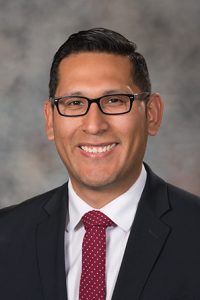Pandemic recovery funds sought for South Omaha
The state would direct $50 million in federal pandemic relief funds to South Omaha under a bill heard Feb. 14 by the Appropriations Committee.

Omaha Sen. Tony Vargas, sponsor of LB1238, said South Omaha has been one of the hardest hit areas in Nebraska by COVID-19. The area’s Latino population has kept the state’s meatpacking, construction and food service industries functioning during the pandemic, he said, and the bill would be an “unprecedented opportunity” to respond to the crisis and promote economic development in the community.
“We should be investing in the parts of our state that have been … greatly affected by this public health crisis,” he said. “All of the metrics and data points show that South Omaha is one of those communities.”
The bill would create the South Omaha Recovery Grant Program within the state Department of Economic Development and allocate $50 million in federal American Rescue Plan Act funds to the program. Funds would be granted to public and private entities to respond to the negative impact of the COVID-19 public health emergency within qualified census tracts — as defined in federal law — within the boundaries of a metropolitan class city.
Omaha currently is the state’s only metropolitan class city.
Nearly two dozen community leaders and activists testified in support of the proposal, noting past discrimination, historic lack of investment in South Omaha and the disproportionate impact of the pandemic on its population.
Itzel Lopez, president of the Latino Economic Development Council, testified in favor of the bill. Latinos comprise 13.4 percent of the total population of Douglas County, but were 21.7 percent of COVID-19 cases, she said, making them the ethnic group hardest hit by the pandemic.
“Businesses and families in this district have been devastated,” Lopez said. “As a result, the community has endured physical sickness and distress while also suffering economic hardship.”
Alfonso Vaca-Lubischer, representing Voices for Children in Nebraska, also spoke in support. More than 60 percent of the South Omaha population lives in a qualified census tract, he said, and both the unemployment and poverty rates there are more than double the state average.
“Unfortunately, in Nebraska right now, access to opportunity is often determined by the zip code in which a child lives,” Vaca-Lubischer said. “The federal funding currently available is an opportunity to make a transformative investment in the next generation of kids in South Omaha.”
Also testifying in support was acting Deputy Chief Sherie Thomas, speaking on behalf of the Omaha Police Department. The bill would address the negative impacts of COVID-19 in the community, including unemployment, wage losses, homelessness and food insecurity, she said, and would help deal with the root causes of crime in South Omaha.
Armando Salgado of Omaha said the pandemic has been particularly deadly for the South Omaha community. Speaking on behalf of several organizations, he said that 40 percent of Nebraskans hospitalized with COVID-19 in mid-2021 identified as “Hispanic,” even though the group represents only 11 percent of Nebraska’s population. In addition, he said, Latinos accounted for about 20 percent of COVID-19 deaths in the state.
Salgado said the South Omaha business community has thrived for years, contributing billions to the state’s economy, without assistance from the banking community or investment of state dollars. The pandemic has placed those achievements in jeopardy, he said.
“This crisis has set us back enormously,” Salgado said.
No one testified in opposition to the bill and the committee took no immediate action on it.

